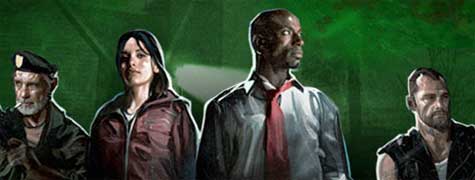(or: ‘More Hudson, Less Hicks’)

“I’d like to introduce you to a close personal friend of mine.”
That close personal friend is Corporal Dwayne Hicks. James Cameron’s Aliens has many things to answer for – especially when it comes to the world of videogames – but I’d argue that in its characters, I see the archetypes of players on every Call of Duty 4 server I’ve visited, every Halo 3 TDM game I’ve joined. Hicks isn’t just a model of professionalism for the survivors of the USS Sulaco’s marine team; he’s a model for legions of gamers everywhere.
The online gaming world is full of Hickses. It’s why I don’t frequent public servers very often. I’m just bored of playing against people who seem to take no joy in their games; just a dreary sense of workmanlike competence. Somehow our games have managed to emphasise competence, professionalism, and dead-eye accuracy over having fun. Perhaps not emphasise; perhaps they go further, fetishizing skill – the reams of statistics detailing kill ratios, the obsession with XP, score, and rank, is often taken by players to be not a part of the game, but the reason to play it. And that seems sad.
Because whilst being the best, and having the best ratio, or the best kit is part of the fun of games, a lot of the fun of online gaming comes from a peculiar kind of theatre that emerges from the best online games.
Not messing around, breaking the rules – that’s no fun – but the kind of play that emerges when you succeed badly. Succeeding despite your skills, rather than because of them.
To go back to Aliens a moment: really, I’d like it if more gamers were more like Bill Paxton’s Private Hudson.

“Game over, man! Game over!”
No, really. Sure, Hudson is a similarly competent professional to his NCO, and I can’t deny that he doesn’t fetishize his toys a little… but he’s also the soul of the party. He’s the goofball you can trust with your life. (Which, now I come to think of it, is Bill Paxton’s stock-in-trade). I’d take a legion of stumbling, wise-cracking Hudsons over a dour Corporal Hicks any day.
And nowhere is this more obvious than in Left 4 Dead.
Lee described the joy of Left 4 Dead as “making dangerous mistakes in the company of friends“. What could be better than that? Taking risks, sometimes being punished, usually being chastised, but then having a chance to redeem yourself, with the people you love? That sounds like the best kind of gaming. Better than competence any day.
And it sounds a lot like a Left 4 Dead campaign a few of us ran a few weeks ago. Time for a story!

It’s the end of the third map of Dead Air – the escape over the skybridge – and the four of us have got to the outside of the airport. We’re a bit worse for wear – we haven’t been bringing our A-games – and by the time we get to the multi-storey carpark, we’re on our last legs; a tank and two horde encounters outside the airport took its toll.
So we decide to run.
It is, after all, not far from the car park to the other side of the skybridge.
We belt it through the carpark, capping the odd zombie on the way, and make it to the safe room. All three of us make it to the safe room.
Jones – who is playing Louis – is nowhere to be seen. We yell for him, and, with our magic Survivor X-Ray vision, see that he’s back outside the carpark. Uh-oh.
So we yell for him to come upstairs. We’ll leave him behind in a heartbeat if we have to, but for now, he deserves a fair crack of the whip. So we watch, as X-Ray Louis limps his way into the carpark. He might just make it.
And then he sets off a car alarm, and we hear the baying of the zombie horde.
What went from being a minor cock-up is now a hilarious balls-up of the highest order. Alice and Mike hunker down in the safe room – sensible them – and I take up position crouched in the corner of the skybridge, assault-rifle ready.
(I am playing Bill, and taking the role-playing of the gruff old veteran a little seriously for the purposes of drama).
“Come on, Matt,” we cheer, and soon we see Louis limping through into the corridor of the skybridge. He’s about halfway down the corridor when the express-train that is the zombie horde piles through the door behind him.
I dump an entire clip of rifle ammo into the zombie-train; Jones gets into the safe room; the gun clicks dry and I run back through the doorway –
– straight into the arms of about eight zombies. This is not, in fact, the safe room. It is an amusingly-positioned closet next to the safe room. Desperately, I bash as hard as I can, scrabbling through the horde, and into safety next door.
Somebody, I forget whom, fends off the crowd of zombies I appear to have dragged into the safe room with me, and the door slams shut.
Not only have we survived, we have also not stopped laughing since the car alarm went off. It’s possibly my favourite Left 4 Dead experience ever. We didn’t survive a round on Expert, we didn’t get an all-headshot round, we didn’t drop a Tank with no damage. We messed up, we made stupid mistakes, and as a result it was more like a zombie movie than any perfect run could be. Together, we made a strange kind of consensual theatre, and we still survived, and it was all an absurd amount of fun. (This session is also is one of the many reasons I’m very excited that Valve are introducing Gauntlets – hectic, running-chase Finales – to Left 4 Dead 2).
I don’t play videogames because I want to have competent, professional militaristic encounters with friends. I’d take Dangerous Mistakes In The Company Of Friends over competence any day. Sure, they may be mistakes, but they’re dangerous! They’re exciting! And sometimes, they make the game better than it ever could be when you play it “right”. I wouldn’t want it any other way.